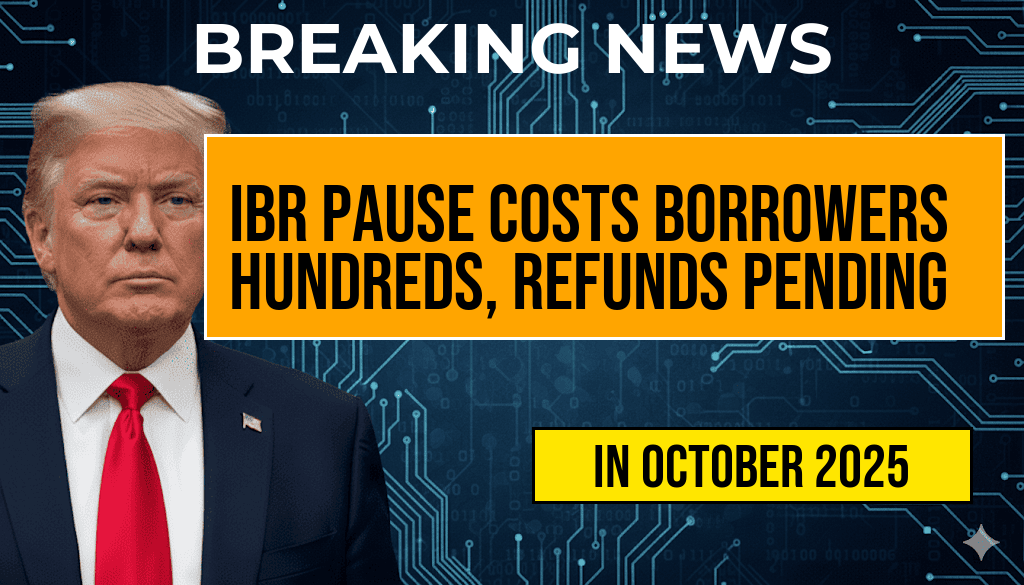The recent pause in the Income-Based Repayment (IBR) program has left many borrowers grappling with unexpected financial repercussions, amounting to hundreds of dollars in losses. As the U.S. Department of Education continues to navigate the complexities of student loan policies, affected borrowers are now eagerly anticipating refunds, although the exact date for these reimbursements remains uncertain. With millions of individuals relying on the IBR program for manageable repayment schedules, the pause has raised significant concerns about the long-term implications for student loan borrowers across the country.
Understanding the IBR Program and Its Recent Changes
The Income-Based Repayment program was designed to assist borrowers by capping monthly payments based on their income and family size. This initiative aims to alleviate the burden of student loan debt, enabling borrowers to make manageable payments while still maintaining their financial stability. However, the pause in the program has highlighted the fragility of this support system.
The Pause’s Impact on Borrowers
During the recent pause, many borrowers found that their monthly payments were not adjusted according to their current financial situations. This oversight has resulted in significant overpayments, with some borrowers losing out on hundreds of dollars. The pause was initially intended to provide relief; however, the actual outcome has been a financial strain for many.
- Overpayments: Borrowers reported overpayment amounts varying widely, with some individuals losing as much as $600.
- Financial Strain: Many borrowers are experiencing difficulty managing their budgets due to the unexpected financial losses.
- Uncertainty: The lack of a clear timeline for refunds has left borrowers anxious and frustrated.
What Borrowers Can Expect Moving Forward
As the situation unfolds, borrowers are advised to stay informed about potential refunds. The Department of Education has indicated that it is working on a plan to return the overpaid amounts, but the exact timeline for these refunds is still to be determined. Borrowers are encouraged to monitor official communications from the Department for updates.
How to Prepare for Refunds
While waiting for refunds, borrowers can take several proactive steps to manage their finances:
- Review Financial Statements: Examine your student loan statements to understand the total amount overpaid during the pause.
- Budget Adjustments: Make necessary adjustments to your monthly budget to account for any financial strain caused by the overpayments.
- Stay Informed: Regularly check the Department of Education’s website and reliable news sources for updates on refund processes.
Looking Ahead: The Future of Student Loan Repayment
The pause in the IBR program has sparked broader conversations about the future of student loan repayment options. As discussions continue in Congress and among policymakers, borrowers are hopeful for reforms that will provide more consistent and reliable support systems. The need for transparency and effective communication from the Department of Education has never been more critical.
Resources for Borrowers
For those navigating the complexities of student loan repayment, several resources can provide assistance:
- Federal Student Aid – A comprehensive resource for understanding student loans and repayment options.
- Forbes – Student Loan Repayment Guide – Expert advice on managing student loan repayment effectively.
- Wikipedia – Income-Driven Repayment – An overview of the IBR program and its implications.
| Borrower Type | Average Overpayment ($) | Potential Refund Timeline |
|---|---|---|
| Single Borrowers | 300 | To Be Determined |
| Married Borrowers | 600 | To Be Determined |
| Parents of Borrowers | 450 | To Be Determined |
As the Department of Education works towards resolving these issues, borrowers are reminded to maintain records of their payments and communicate any discrepancies to their loan servicers. The path forward may be fraught with challenges, but with persistence and support, borrowers can navigate this turbulent landscape.
Frequently Asked Questions
What is the IBR pause and how does it affect borrowers?
The IBR pause refers to the temporary suspension of the Income-Based Repayment program for federal student loans. This pause can lead to financial losses for borrowers who are not able to take advantage of the repayment options available during this time.
How much money might borrowers lose due to the IBR pause?
Borrowers could potentially lose hundreds of dollars due to the IBR pause, depending on their individual loan amounts and repayment terms. The lack of repayment options can result in higher overall costs for these borrowers.
Will borrowers receive refunds for the losses incurred during the IBR pause?
Yes, refunds are expected for borrowers who have been adversely affected by the IBR pause. However, the specific date for these refunds has yet to be determined.
What steps should borrowers take if they are impacted by the IBR pause?
Borrowers should stay informed about updates regarding the IBR pause and any potential refunds. It is also advisable to contact their loan servicer for personalized guidance and to understand their repayment options during this period.
When can we expect more information about the refund dates?
While the exact date for the refunds has not been announced, borrowers are encouraged to monitor official communications from the Department of Education for timely updates regarding the situation.






